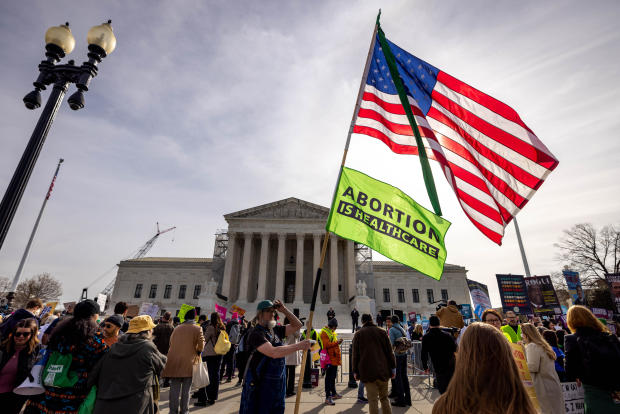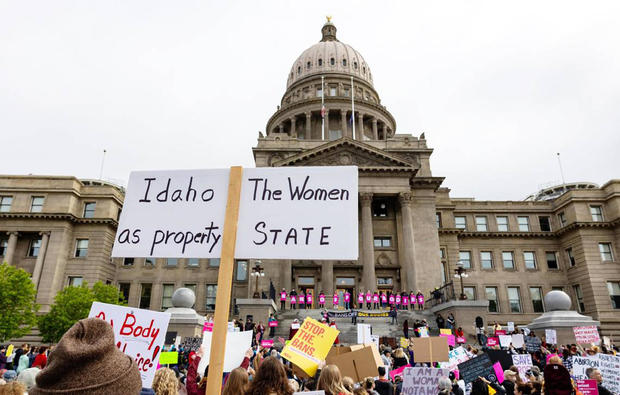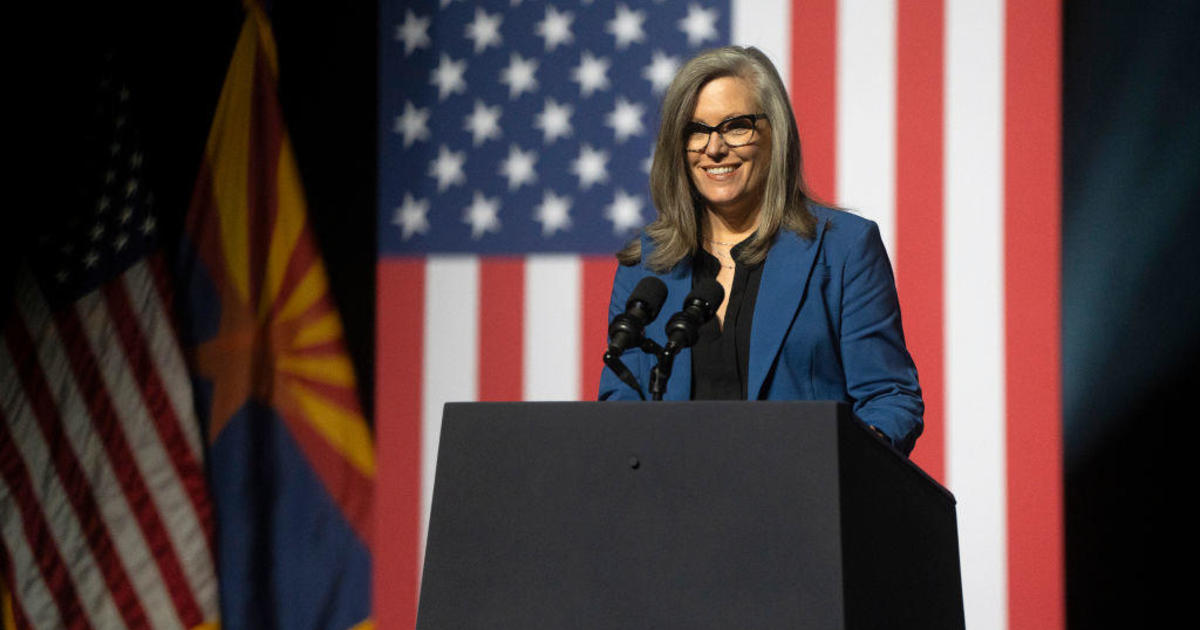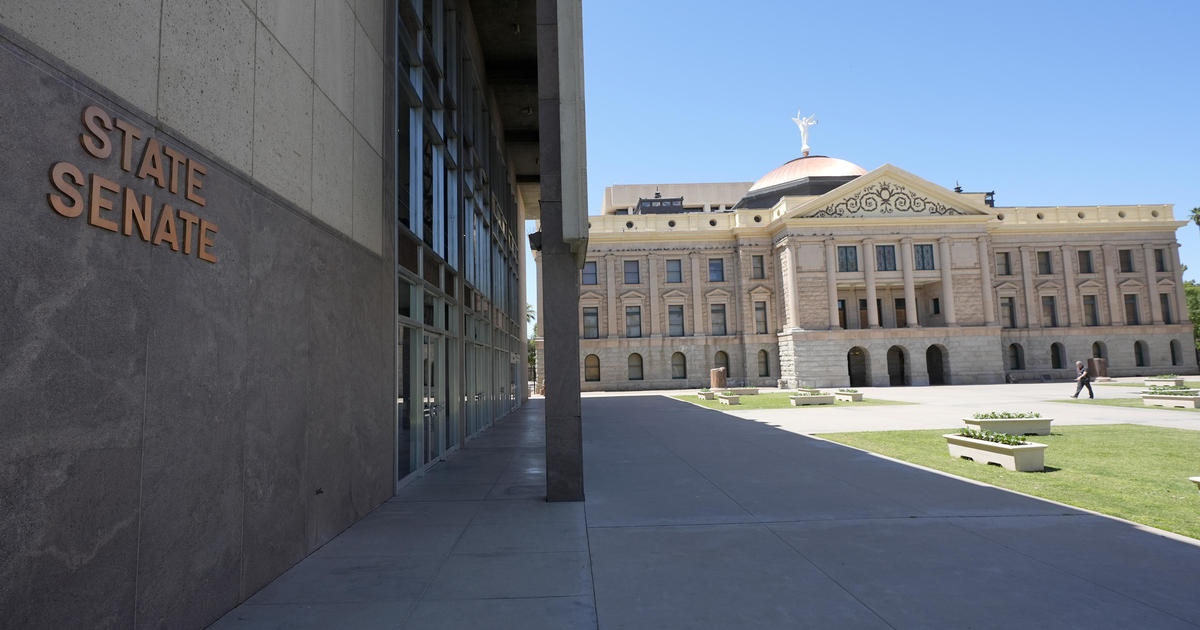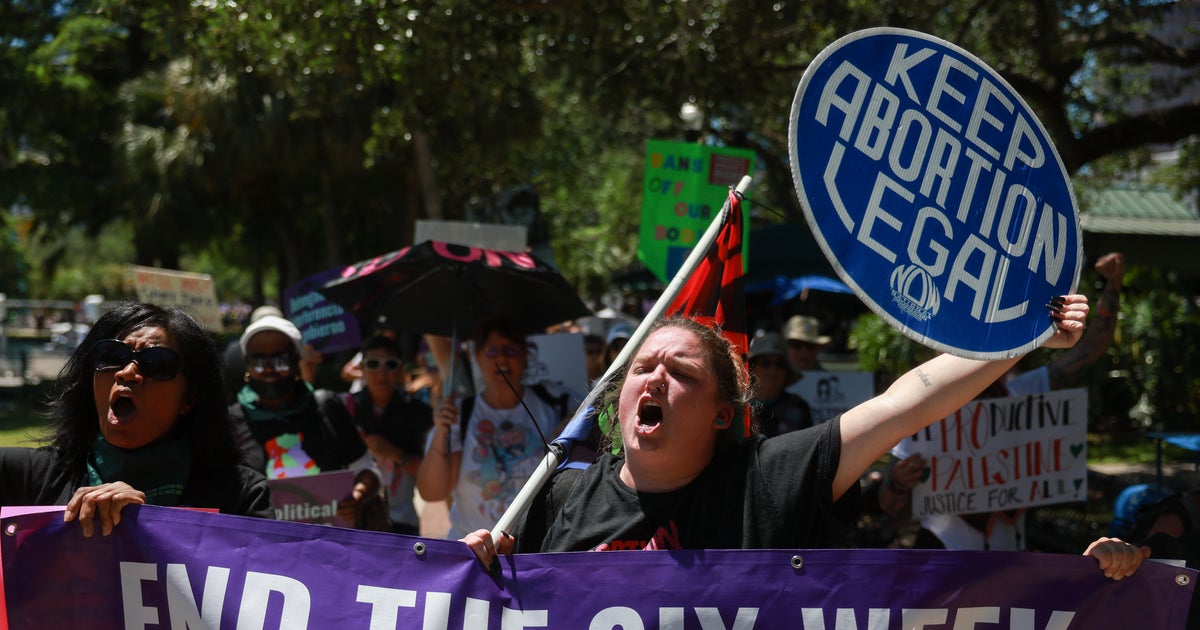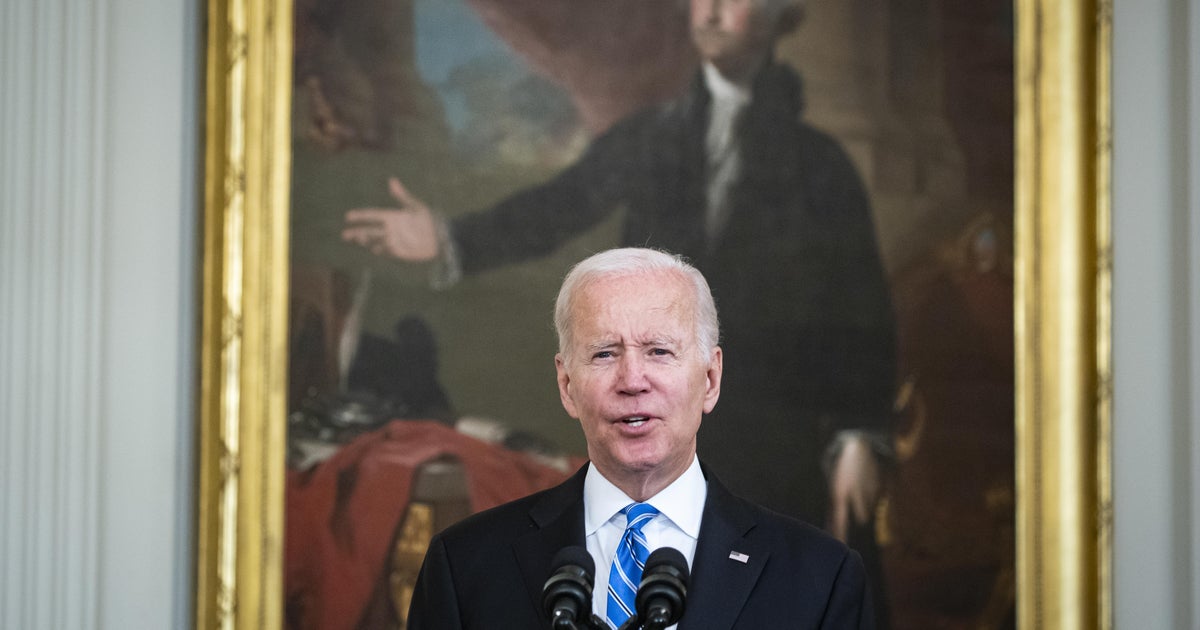Supreme Court to consider clash of Idaho abortion ban with federal law for emergency care
Washington — Less than two years after the Supreme Court returned abortion policy to the states by overturning Roe v. Wade, the justices will hear the second of two cases in a month's span that involve efforts to restrict access to the procedure.
The latest dispute to be argued Wednesday involves the interplay between Idaho's near-total ban on abortion and a federal law that requires Medicare-participating hospitals to provide necessary stabilizing treatment, including emergency abortion care, to a mother whose health is at serious risk.
Idaho's law went into effect after the Supreme Court overturned Roe in June 2022 and makes it a felony for physicians to perform most abortions, except when necessary to save the life of the mother. But the Biden administration sued the state in August 2022, arguing its law is unconstitutional and preempted by the Emergency Medical Treatment and Labor Act, or EMTALA.
A federal district court in Idaho agreed and allowed physicians to perform abortions in certain emergency situations.
"We should not forget the one person with the greatest stake in the outcome of this case — the pregnant patient, laying on a gurney in an emergency room facing the terrifying prospect of a pregnancy complication that may claim her life," U.S. District Judge B. Lynn Winmill wrote in an August 2022 order imposing a preliminary injunction.
A three-judge panel of the U.S. Court of Appeals for the 9th Circuit allowed the law to be enforced while litigation continued. But the full 9th Circuit, which reviewed the panel's ruling, reinstated the district court's order in October.
The Supreme Court in early January said it would decide whether EMTALA preempts state laws that prohibit most abortions, but allowed Idaho to continue enforcing its ban in certain emergency medical situations until it issues a decision, expected by the end of June.
In his decision allowing abortions to be performed in limited medical emergencies, such as to avoid placing the health of the mother in "serious jeopardy" or a "serious impairment" to the patient, Winmill warned about doctors feeling "hobbled" by a law that prohibits them from providing the medical care necessary to preserve a pregnant woman's health.
Now, with Idaho's ban still in force, doctors in the state have indicated his predictions have proven true.
"It's an impossible position for physicians and any provider to be stuck in and a terrible position to be in," said Dr. Lauren Miller, a maternal fetal medicine specialist who practiced for five years in Boise. "If you act too soon, you're a felon, and if you act too late, the patient could die or be permanently injured."
Miller left Idaho last year and moved with her family to Colorado, where she now provides clinical care, after she said the dilemma of protecting herself from the threat of prosecution or providing the medical care necessary to protect her patients' health became too great.
"There's all these cascading effects of not being able to do reflexively what you know is right and providing the best health care," she said. "It can't be understated that you're forced to participate in wrongdoing and forced to do something wrong medically and wrong morally. You're being forced to deny appropriate care to comply with the law to not be a felon."
Miller signed on to a friend-of-the-court brief with three other OB-GYNs who are supporting the Biden administration in the case. The doctors told the justices that accepting Idaho's interpretation of EMTALA would have the "absurd result" of placing the law at odds with medical ethics.
"There's a definite moral injury and a feeling that my state law is limiting my ability to provide care to the fullest extent of my oath, within my faith beliefs, within my beliefs as a physician and within the evidence-based medicine," Dr. Nikki Zite, an OB-GYN in Tennessee who joined Miller on the brief, told CBS News.
Zite, who practices at the University of Tennessee Medical Center, is the only complex family OB-GYN in east Tennessee. Like Idaho, the state prohibits abortions at all stages of pregnancy, but has exceptions for molar pregnancies and ectopic pregnancies. The law also allows doctors to use their "reasonable medical judgment" to end a pregnancy to prevent the death of the mother or serious risk of "substantial and irreversible" harm to the pregnant woman.
But Zite said the exception still puts doctors at risk. If Idaho prevails and states enact more stringent abortion bans that allow for pregnancies to be terminated only to prevent the death of the mother, it could lead to a patchwork of emergency care.
"We have always worried about medical malpractice," she said. "We've never had to worry about committing a felony taking care of patients."
The dispute over EMTALA
Idaho is one of 14 states that ban abortion with some exceptions, according to the Guttmacher Institute, a pro-abortion rights research organization, while another seven outlaw abortion in the first 18 weeks of pregnancy.
A group of 22 states, many of which have the most stringent abortion laws, are siding with Idaho in the dispute, arguing that the Biden administration is attempting to invalidate state laws that protect the unborn.
But states can still enforce their abortion restrictions, said Meghan Boone, a law professor at Wake Forest University who is an expert on reproductive rights.
"The overlap here where there could be a potential conflict between what EMTALA requires and what Idaho says is criminal is a fairly narrow range of cases. It's not going to cover all abortions," she said. "It's not like EMTALA entirely preempts the entirety of a state law that criminalizes or bans abortion. It's abortion care that falls in the space between what might be required for stabilizing emergency care and where the state draws the line, which is imminent death of the pregnant person."
Boone continued: "Between those goalposts are the conflicts that are at the heart of the case."
EMTALA was enacted in 1986 to address concerns that hospitals were engaging in "patient dumping" by discharging or transferring patients who did not have insurance. The law created a national minimum care standard for hospitals participating in Medicare by requiring them to offer stabilizing treatment to any patient with an emergency condition that threatens their life or health.
The Biden administration argues that in some cases, that stabilizing care involves terminating the pregnancy. Still, the instances where EMTALA and the Idaho abortion ban are at odds are rare.
If a condition arises later in pregnancy and the fetus can be delivered, there is no conflict between federal and state law, Solicitor General Elizabeth Prelogar wrote in a court filing. But it does arise when a pregnant woman is suffering from an emergency medical condition that, absent ending the pregnancy, threatens serious harm to her health, but not her life, she said. In those circumstances, EMTALA overrides the Idaho ban, Prelogar said.
"Delaying care until the woman's condition deteriorates and the doctor can say that termination is necessary to prevent her death, as Idaho law requires, stacks tragedy upon tragedy with little additional likelihood of fetal survival," she wrote.
If the court were to accept Idaho's argument that state abortion laws supersede EMTALA's stabilization requirement, Prelogar warned it would allow its meaning to vary from state-to-state, "thwarting Congress's promise of essential emergency care to all Americans."
"If we start to say a minimum standard of care unless state law has something to say, we don't have a uniform, national standard of care," Boone said.
But lawyers for Idaho's Republican legislative leader argued that EMTALA does not include a requirement to perform abortions that conflict with Idaho law. They claimed the Biden administration's reading of EMTALA is an "intolerable federal power grab," and called the law a"patient-dumping statute, not an abortion-access statute."
"EMTALA is not [the Department of Health and Human Services'] Trojan horse for nationwide abortion rules. EMTALA nowhere mentions abortion," Republican state lawmakers said in a filing to the court. "Reading EMTALA as empowering HHS to displace state abortion laws defies the usual expectations of how Congress legislates and distorts the Constitution's separation of powers."
In a separate filing from Idaho's attorney general, state lawyers claimed the Biden administration is attempting to construct an abortion mandate out of EMTALA, and allowing that could have ramifications beyond the abortion context.
"It would allow the federal government to pay hospitals to violate state law, exempting emergency-room doctors from the state-law standards of practice that govern the treatments they are authorized to provide," Attorney General Raúl Labrador wrote. "Nothing about that nullification of state law is narrow, and it is not, and will not be, limited to abortion."
The fallout from Roe's reversal
The legal battle from Idaho demonstrates the fallout from the Supreme Court's decision unwinding the constitutional right to abortion and the confusion that has arisen as physicians try to navigate narrow exceptions written into state laws restricting abortion.
For Zite, in Tennessee, discussions about the best care for a pregnant patient that previously occurred between fellow OB-GYNs and medical staff now include legal counsel. Dr. Jim Souza, chief physician executive for Boise-based St. Luke's Health System, said there is now "second-guessing" and "hand-wringing" about whether an abortion can be performed within the bounds of Idaho's law.
Under Idaho's ban, abortions are allowed when necessary to save the mother's life, but EMTALA requires care to preserve her health. Souza said there are a lot of negative health outcomes that can arise before it becomes clear that her life is in jeopardy.
"It casts the issue as if life and death are binary events. They most definitely are not. In between life and death is an entire spectrum called health," he told CBS News.
In the past, if an expectant mother who was 17 weeks pregnant suffered a ruptured membrane and was in preterm labor, the treatment would've been to terminate the pregnancy, effectively ending the risk to her health and life.
But now, a physician concerned about the legal consequences may decide to wait if an ultrasound shows a heartbeat, putting the patient at risk of developing an infection and then septic shock.
"The mom's health is in the balance. If we wait too long, the mom's life will be in the balance," Souza said.
To alleviate that tension, Souza said hospitals have sent patients to neighboring states on transport flights where they can get abortion care "without the worry of the physician that he or she is going to be prosecuted, lose their license and go to jail."
In 2023, when Idaho physicians could provide abortions in emergency situations because of the lower court's order, one patient was transferred out of state, Souza said. But in the months since Idaho was allowed to enforce the ban in emergency circumstances, six patients with medical emergencies have been flown out of state, and he estimated that number will rise to 20 by the end of 2024.
But pregnancy complications are time-sensitive emergencies, Souza said, and the delay that comes with flying a patient out of state further puts her health in jeopardy.
While no doctor has been prosecuted or charged for violating Idaho's abortion ban, Souza said health care workers believe there is a real risk they could face criminal penalties for terminating a pregnancy in emergency situations.
"How do you tell someone who's afraid that their fear is unfounded?" he said. "I believe the only way you can do that is to provide very clear evidence that there's not a basis for the fear. The law says you may act in order to prevent the death of the mother. There seems to be a lot of things that can happen on the way to that."
Souza said the district court's ruling that allowed some abortions in emergency situations, as required by EMTALA, gave physicians some peace of mind when making decisions about how to manage a pregnant patient with an emergency medical condition.
But even if the Biden administration prevails before the Supreme Court, he said there is a need for more clarity from the state legislature, which is Republican controlled, to address the fear many physicians are facing and is driving them to leave the state.
"Keeping our current EMTALA safe harbor keeps the level of fear right where it is," Souza said. "Taking that away escalates it, and the only thing that alleviates it is clarity."
Idaho has lost at least 22% of its OB-GYNs since August 2022, according to a report from the Idaho Physician Well-Being Action Collaborative. For St. Luke's, the state's largest private employer, it's taking longer to fill open physician positions, Souza said, and the number of applicants has fallen off, particularly in obstetrics. With obstetrical providers leaving the state, some hospitals have shuttered their labor and delivery services.
As a result, "it destabilizes the system of care upon which our patients and citizens are dependent," Souza said. And as Idaho's population continues to grow, the lack of providers has wide-reaching effects, particularly for young women and those over 65.
"Those women are going to need access to gynecologic care to manage the health of the reproductive organs," Souza said. "The same doctors who are leaving because of the jeopardy that they find themselves in in obstetrical care, those are the same doctors that also provide the gynecological care. So this is not just an issue for young women, this is an issue for all women."
Miller said Idaho already had maternity care deserts before its ban took effect, and she worried the landscape will only worsen if struggles in recruiting physicians who work in obstetrics persist.
"It's the full spectrum of life that we're trying our best to preserve," she said, "and having little carve-outs that say yes, you can do that, or no misses the big global picture that health care is not black and white."
